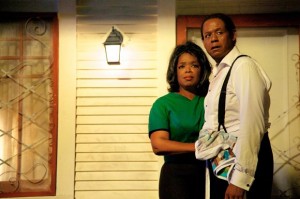Interview: Lee Daniels of “The Butler”
Posted on August 12, 2013 at 7:00 am
“Lee Daniels’ The Butler” is inspired by the real-life story of a black man who worked in the White House for decades, serving eight Presidents from Truman to Reagan. Born in the Jim Crow-era South of lynchings and segregation, he lived long enough to cast a vote for Barack Obama. Forest Whitaker plays Cecil, the butler, Oprah Winfrey his wife, Gloria, and David Oyelowois their son, Louis, who becomes a leader in the Civil Rights movement. The cast also includes Robin Williams as Dwight D. Eisenhower, Alan Rickman and Jane Fonda as Ronald and Nancy Reagan, John Cusack as Richard Nixon, and Vanessa Redgrave as a plantation owner.
One of the challenges of a film like this is dressing all the characters over decades of changes in style and fabrics. How did you manage that?
That is the formidable and brilliant Ruth Carter, who does not get enough credit for her work. She’s worked with Spike Lee on “Malcolm X” and some of his other films. She’s an Academy Award-nominated African-American costume designer, the first I think, who really understood the period, really understood the generational differences as time passed and gave me her heart and soul. She was as exciting to work with as Oprah.
How do you evoke the important details of such a large swath of history without getting lost?
We don’t focus on history. History is the backdrop. The focus is the family. I have to tell what I know. I’ve never been in the White House. So that was really a specific choice to focus on the father and son love story and make the rest of it a backdrop, the White House and the Civil Rights movement. Otherwise it is not a story; it’s a history lesson. Danny Strong wrote an incredible script. He know so much about history. I had to do some research on the White House, but the sit-ins, the bus rides, the different drinking fountains, those were things my family and I experienced. I once drank from a “whites only” fountain and got slapped by my dad. I thought there would be Sprite coming out of there! My experience is that experience, either from personal experience or from my mom or my dad, or my aunts and uncles and grandparents.
How did you talk with Forest Whitaker, who plays the title character, about the way his character would show his age over the course of the film?
He is one of if not the premier actors of our generation. He brings a load of stuff that he’s studied and thought about. For me, it was really about being a puppeteer, guiding him, telling him maybe a little too much here or there but it’s all him. I just told him when to bring it down or bring it up, like adjusting the volume. He comes at you like a cannon, but with humility.
Why was it so important to you to get Oprah Winfrey to appear in this film?
We are friends, because she produced “Precious.” We were looking for something to do together. But then she got nervous. And I said, “Wait a minute. You told me you were looking for something. Now I done brought you something. Now you’re getting nervous because of something called OWN. I don’t care about OWN. I care about seeing you as an actress, the way you were in ‘The Color Purple.'” I pushed her, pushed her, begged, pleaded. Cried. Until she came to Poppa. Then once I got her, it was intimidating. Not because of her. It was in my head. I was “Oh, my God, it’s OPRAH! What do I do?” So it was about un-knowing her. That’s what excites me as a director, taking people and confusing the audience about who they are, who they think they know. Because I remembered the actor she was and the work she’d done for “The Color Purple.” So it was about me stripping her down and once that happened she was vulnerable. She was raw. She was nervous. She was anxious. She was like a little girl. And I felt very protective of her. She was just one of the crew, lining up for that messy food at craft services with everyone else, one of the gang. The only ego was the film.
What do you want people to talk about on the way home from this film?
How they could laugh and cry at the same time. How I didn’t take it too seriously. In the research I did with the slaves and the Civil Rights movement, they didn’t take it too seriously. If they didn’t laugh, they got terrified. So they had to laugh through the tears. I hope people will say, “Lee Daniels did not take it too seriously, and by that he told the truth.”
There is a strong theme in the film about the meaning of service. What does it mean to serve?
To help. To help in any way possible. Louis helped his country by doing what he did and Cecil helped his country by doing what he did.

Just curious about some of the phrases used in the dialogue….were people really saying , “That’s what I’m talking about.” —-“I brought you into this world I can take you out”—– (Bill Cosby used this line on Theo on his TV show) that far back in time???
Good question, Ms. Conway! Writers face a dilemma in trying to make characters sound authentic without making it distracting. As I explained in an earlier post, it is harder to get the language right than it is to get the costumes and props right in period productions. I know the expression “I brought you into this world and I can take you out” goes back at least to the 40’s, but “that’s what I’m talking about” sounds more recent to me.